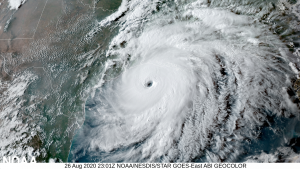June 2021 Newsletter

June 2021 Newsletter
Welcome to the Southeast Climate Adaptation Science Center’s June 2021 Newsletter.
For news and upcoming events related to the Southeast Climate Adaptation Science Center,
subscribe to our monthly newsletter.
SE CASC News | Resources | Publications | Tribal News | Partner News | Webinars | Events | Opportunities

Southeast Climate Adaptation Science Center News

Join us on July 20, 11AM ET for the next SE CASC Summer Science Seminar. Case Studies of Ecosystem Services Mapping in the Southeast will feature presentations by SE CASC Consortium University graduate students and postdoctoral scholars. Learn more and register.
We’ve initiated three new actionable science projects focused on climate vulnerabilities of wild turkeys and brook trout and on climate connections to harmful algal blooms. Learn more.
SE CASC Researcher James Cronin gave the final presentation in the SE CASC Spring 2021 Science Seminar Series. View a recording of his presentation.
Global Change Fellow, Kathryn Jewell presented the first webinar in the SE CASC Summer Science Seminar Series on June 10, 2021. View a recording of the presentation.
Multi-year research effort in Puerto Rico supported by the SE CASC and NC Coop Unit was featured in the Wildlife Management Institute’s Outdoor News Bulletin. Learn more.
SE CASC-supported publication, Cultural Cognition and Ideological Framing Influence Communication About Zoonotic Disease in the Era of COVID-19 investigates how best to convey the idea that health of humans, wildlife and the environment are connected. Learn more.
SE CASC Researchers Jennifer Cartwright and Dwayne Estes, with USGS Deputy Director Ryan Boyles and others co-authoring, published Improving species status assessments under the U.S. endangered species act and implications for multispecies conservation challenges worldwide, a product of recently-completed SE CASC project Clarifying Science Needs for Southeastern Grasslands. Learn more.
Assistant University Director Aranzazu Lascurain co-authored Addressing the challenges of climate-driven community-led resettlement and site expansion: knowledge sharing, storytelling, healing, and collaborative coalition building.
SE CASC Research Ecologist Mitch Eaton and others published Cape Romain Partnership for Coastal Protection: U.S. Geological Survey Open-File Report 2021–1021, summarizing activities, outcomes, and lessons learned from SE CASC project, Climate Change Adaptation for Coastal National Wildlife Refuges. Learn more.
SE CASC Research Ecologist Adam Terando and Consortium PI John Kupfer, are co-authors to Robust projections of future fire probability for the conterminous United States. Learn more.
USGS has released an updated Wildland Fire Science Strategic Plan. Learn more.
2018-2019 Global Change Fellow, Deja Perkins was featured on NPR Short Wave, #BlackBirdersWeek 2021: Celebrating The Joy Of Birds.
Faculty Affiliate Pubs and Publicity
Consortium PI Paul Armsworth initiated a new NSF project, Species Conservation and Collaborative Governance in an Era of Global Change.
Faculty Affiliate Ryan Emanuel is featured in podcast: “Water in the Lumbee World: Indigenous Rights and the Transformation of Home.”
Faculty Affiliate Marcelo Ardon co-authored Drivers of greenhouse gas emissions from standing dead trees in ghost forests.
Conservation Corridor: Connectivity as an integral part of predicting range shifts.
Resources
FEATURED RESOURCE
 This FEMA website provides guidance about preparing for hurricanes, staying safe during a hurricane, and returning home after a hurricane. NOAA’s Climate Prediction Center recently updated averages for the Atlantic hurricane season, which runs June 1-November 30, using 1991-2020 as the new 30-year period of record. This resulted in increased averages, with 14 named storms and 7 hurricanes; the average for major hurricanes (Category 3, 4 or 5) stayed the same, at 3. Learn more.
This FEMA website provides guidance about preparing for hurricanes, staying safe during a hurricane, and returning home after a hurricane. NOAA’s Climate Prediction Center recently updated averages for the Atlantic hurricane season, which runs June 1-November 30, using 1991-2020 as the new 30-year period of record. This resulted in increased averages, with 14 named storms and 7 hurricanes; the average for major hurricanes (Category 3, 4 or 5) stayed the same, at 3. Learn more.
Southeast Florida Climate Indicators. The Southeast Florida Regional Climate Compact has updated the physical indicators of climate change that threaten the region. These include temperature, precipitation, sea level rise, high tide flooding, salt water intrusion, and sea surface temperature. Learn more.
IPBES-IPCC Co-Sponsored Workshop Report on Biodiversity and Climate Change. This collaboration between two intergovernmental bodies focused on the synergies and trade-offs between mitigating climate change and biodiversity loss. Read the report. Also described in NY Times, Our Response to Climate Change Is Missing Something Big, Scientists Say.
Tree Equity Score. This tool by American Forests calculates scores based on how much tree canopy and surface temperature align with income, employment, race, age and health factors for 486 Census-defined urbanized areas in the U.S. to support using urban forests as a tool to slow climate change, improve public health and promote social equity. Learn more.
What is a living shoreline? NOAA has developed an infographic and centralized resources about living shorelines, a green infrastructure technique that provides ecosystem protection against waves and storms in coastal zones. Learn more.
In the Media
Along Southeast Coast, Plan to Protect 1 Million Acres of Salt Marsh Draws Broad Support. PewTrusts.org
As Floods Become More Frequent, Climate Change Threatens Seminole Tribe of Florida. NativeNewsOnline
EPA revives climate change website, adds ‘indicators’ data. CoastalReview.org
How Do Animals Safely Cross a Highway? Take a Look. NY Times
Why are there so many Atlantic named storms? Five possible explanations.Yale Climate Connections
Notable Publications
The growing challenge of vegetation change. Authors point to paleoclimatological research that demonstrates that humans have significantly altered vegetation on the planet even in pre-industrial times, vegetation that will experience dramatic effects given projected increases in temperature. They propose that rather than attempt to maintain forest vegetation as it has been in the 20th century, it will likely be more effective to manage them for the ecosystem services they provide, including carbon sequestration. Costs to do so could be paid to those supporting the maintenance of these ecosystem services, likely rural and Indigenous communities. Link to article.
Rapid increases and extreme months in projections of United States high-tide flooding. Recurrent coastal flooding during high tide is an issue in many areas of especially the Atlantic seaboard and is projected to become more frequent with increasing sea level rise. This study used NOAA SLR scenarios and common high tide flooding (HTF) thresholds to characterize rates of increases in HTF frequency to facilitate planning horizons and adaptation strategies for coastal planning. They identified a year of inflection marking potential onset of rapid HTF increases, estimated at mid-century for most areas and estimated time periods where HTF events would be clustered. Researchers recommend that adaptation and mitigation strategies account for brief periods experiencing an extreme number of HTF days. Link to article.
Prioritization of vulnerable species under scenarios of anthropogenic-driven change in Georgia’s coastal plain. Researchers used species distribution models to estimate potential habitat amount and distribution for 15 species in the coastal plain of Georgia. They were then able to predict exposure to habitat changes due sea level rise and urban growth. It is likely that all of the study species will experience some exposure to habitat change due to anthropogenic stressors, but only few will experience a high level of exposure. Those species that inhabit salt marsh and beach ecosystems had the highest exposure to sea level rise and inland populations had the highest exposure to urban growth. These results suggest that land managers may need to prioritize species and their habitats based on predicted habitat loss while taking into account the species vulnerability and current amount of protected habitat areas. Link to article.
Large model structural uncertainty in global projections of urban heat waves. Journal Abstract: Urban heat waves (UHWs) are strongly associated with socioeconomic impacts. Here, we use an urban climate emulator combined with large ensemble global climate simulations to show that, at the urban scale a large proportion of the variability results from the model structural uncertainty in projecting UHWs in the coming decades under climate change. Omission of this uncertainty would considerably underestimate the risk of UHW. Results show that, for cities in four high-stake regions – the Great Lakes of North America, Southern Europe, Central India, and North China – a virtually unlikely (0.01% probability) UHW projected by single-model ensembles is estimated by our model with probabilities of 23.73%, 4.24%, 1.56%, and 14.76% respectively in 2061–2070 under a high-emission scenario. Our findings suggest that for urban-scale extremes, policymakers and stakeholders will have to plan for larger uncertainties than what a single model predicts if decisions are informed based on urban climate simulations. Link to article.
The rise in climate change-induced federal fishery disasters in the United States. Fisheries are critical to coastal communities and economies, however information about the causes and impacts of fishery disasters is lacking. Researchers estimate a loss of $2B in Congressional allocations, and roughly $3.2B in direct revenue loss from 1989-2000 due to fishery disasters. The frequency of these events has increased over time with a noticeable shift to being caused by extreme environmental events such as marine heatwaves, hurricanes, and harmful algal blooms. As climate change continues to drive the increase in the instances of these events, researchers argue that the federal system for fisheries disaster declaration must expand to meet the demand for disaster assistance allocation. Link to article.

Tribal News
Visit USET Climate Change Headlines for updates on information regarding climate science events, funding opportunities, best practices, and highlights from across the USET region.
The USET Climate Change Resilience Program has a new website! Learn about upcoming events, webinars, and funding opportunities and explore climate change resources for the USET region. Learn more.
Register now for the virtual USET Tribal Climate Resilience Camp scheduled for July 12-16, 2021. Tribal Nations will have the opportunity to explore examples of climate adaptation planning, develop climate adaptation strategies that align with the priorities of their community, and create a strategy to engage the community in climate adaptation planning. Learn more.
National Park Service Office of Native American Affairs is hosting a webinar on June 30 at 1PM ET as part of the Native Nations & Climate Change Webinar Series, NPS Tribal Programs and Funding Opportunities: An Overview. Learn more and register.
The virtual National Adaptation Forum has announced a call for presentations highlighting Tribal and Indigenous climate change adaptation. Priority will be given to Tribal and Indigenous-led projects/proposals. The deadline to submit a proposal has been extended to June 30. Learn more.
USACE Tribal Nations Technical Center of Expertise has created the Rivercane Restoration Alliance which is dedicated to combining Traditional Indigenous Ecological Knowledge and Traditional Western Ecological Knowledge to achieve the successful recovery of rivercane – an important cultural keystone species. Learn more.

Regional Partner News
Association of Fish and Wildlife Agencies: Climate Adaptation Newsletters.
National Integrated Drought Information System: NIDIS and Partners Launch National Soil Moisture Strategy.
USDA Southeast Climate Hub: Hurricane Preparation and Recovery Commodity Guides
Southeast Conservation Adaptation Strategy: SECAS Steering Committee update.
Southeast Regional Climate Center: Monthly Regional Climate Reports.
USDA National Institute of Food and Agriculture: Rising Nighttime Temps Rob Yields in Rice, Wheat.

Webinars
Find more upcoming events in our calendar.
June 24 | 10am – 11am | Perspectives on Climate and Environmental Justice on the Gulf Coast
June 24 | 2pm – 3pm | Climate and Heat: Trends, Health Impacts and Risks
June 25 | 2pm – 2:30pm | The Role of Drought in Aquatic Systems: Population and Community Dynamics
June 29 | 2:30pm – 3:30pm | The space where innovation and climate resilience meet
June 30 | 12pm – 1pm | Continued Partnerships Beyond a Grant: A case study of co-production partnerships in pest management and rodent-borne pathogen research
July 1 | 9am – 10am | Climate and Conservation Coffee
July 13 | 10am – 10:45am | Southeast Climate Monthly Webinar + New Climate Normals
July 13 | 3pm – 4pm | Ridge-to-Reef and Icefield-to-Ocean: Collaborative Research in Extreme Environments
July 15 | 10am – 11am | South Atlantic Third Thursday Web Forum
July 20 | 11am – 12pm | Case Studies of Ecosystem Services Mapping in the Southeast
Upcoming Events
July 26-29 & Aug. 2-5 | National Conference on Ecosystem Restoration | Virtual
Aug 12-13 | Georgia Climate Conference 2021 | Jekyll Island, GA
Sept. 8 | Understanding Algal Blooms: State of the Science Conference | Virtual
Oct. 6-10 | 8th Annual HBCU Climate Change Conference | New Orleans, LA

Opportunities
Student Announcements
National CASC is accepting applications for a student job opportunity in project tracking, systems management, and user experience. Apply here by June 25.
A call for abstracts for oral and poster presentations has been announced for the 8th Annual HBCU Climate Change Conference. Students may submit abstracts here until July 15th.
Applications are now being accepted for the 2022 David H. Smith Conservation Research Fellowship program. Apply here by September 24.
The Virginia Tech School of Public & International Affairs and Fralin Life Sciences Institute is accepting applications for a Ph.D. opportunity in Species Conservation and Collaborative Governance in an Era of Global Change with a proposed start date of Aug. 2021 or Jan. 2022. Learn more.
Hiring Announcements
University of Minnesota’s Institute on the Environment is recruiting multiple researchers, postdocs, Ph.D. students, and a research coordinator to join their Knowledge Initiatives team. Apply here by June 28. Applications will be accepted until the position is filled.
Pacific Institute is hiring a Research Associate to support research and analysis that advances water and climate change sustainability. Apply here by July 1.
National Center for Atmospheric Research is accepting applications for a Program Specialist with the NOAA Regional Integrated Sciences and Assessments program in San Juan, Puerto Rico. Apply here.
The Nature Conservancy is accepting applications for a Community-Led Conservation Program Associate and a North America ILC Program Associate. Learn more.
Research Grants
USDA is seeking proposals for projects to measure the climate benefits of land enrolled in the Conservation Reserve Program. Proposals may be submitted here until July 2.
National Fish and Wildlife Foundation’s Southeast Aquatics Fund is soliciting proposals for projects that intend to restore habitats and improve water quality in targeted river basins and watersheds of the Southeast. Full proposals are due here by July 20.
National Academies’ Gulf Research Program has announced a request for applications for the Gulf Sea Level Variation and Rise grants program. Notice of Intents are due here by July 21.
National Academies’ Gulf Research Program has announced a request for applications for the Bridging Knowledge to Action grants program. Letters of Intent are due here by July 29.
- Categories:


